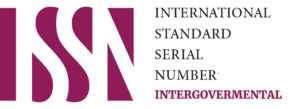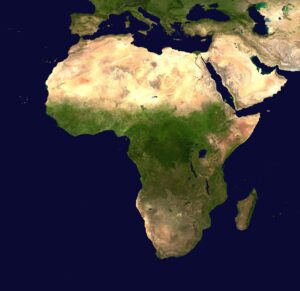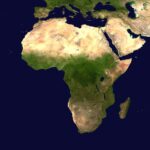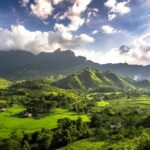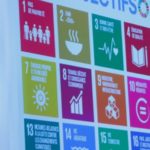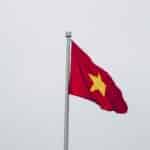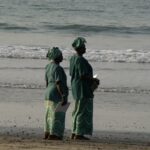ABSTRACT
| The paper focuses on the Senegambia region (The Gambia and Senegal), which shares the same socio-cultural and religious identity, although separated by a boundary during the colonial era. The paper proceeds as follows. It presents the historical background of Sufi brotherhoods, particularly Mouridism in Senegambia. It examines the socio-political and economic impact of the Sufi brotherhoods. It also explore the role of Mouridism in the evolution of the status of women and children. In the remaining sections, I discuss the recommendations and conclusion, including harnessing religion to promote African economic and socio-political development.
The literature on the role of Sufi brotherhoods in West Africa is very scanty. Therefore, this paper aims to add to the body of literature on religion’s role in promoting development, focusing on the Mourid economic and development model. |
|
- Introduction
The spread of Islam in West Africa, especially in the Senegambia region, can be traced back to the trans-Saharan trade in the 11th century. A few centuries ago, Islam in Senegambia predominantly assumed the form of Sufi brotherhoods due to trade, migration, and contact with Northern African Berbers and scholars. Each Sufi brotherhood is headed by a spiritual guide (Marabout) with a patrilineal line of leadership heritage, which the oldest male child or grandchild governs. “While Senegal counts a handful of brotherhoods, the Mourides stand alone with unequalled economic influence and an uncanny sway over political happenings.”[1] Over 90% of Senegambia’s population is Muslim, with the majority practicing Sufism (Tasawwuf). The dominant Sufi brotherhoods in Senegambia are Tijaniyya, Murridiyya, Qadiriyya, and Layenes. These brotherhoods gained prominence in the 19th century. Amadou Bamba (Borom Touba), founder of Mouridism, and El-Hajj Malick Sy, leader of the Tidiane brotherhood, introduced today’s Sufism to Senegal in the late 19th century. It is a form of mystical Islam that hinges on the relationship between a disciple, or talibe, and his marabout.[2]
Religion is widely practiced globally and forms part of the societal, cultural norms, values, and belief systems. Many studies conducted regarding religion’s role in economic development provide mixed results. The overarching findings generally conclude that religion has no or a limited role in promoting economic development. Some studies[3] concluded that religious service attendance depresses economic growth because the output is unproductive and contributes less to facilitating economic growth and development.
Although the Senegambia region (Senegal and The Gambia) is secular, the separation of religion and the state is merely on paper. The various Sufi brotherhoods have so much following and influence on the people that every government would be highly diligent in dealing with matters concerning these brotherhoods.
In Senegal, as of 2016, “about 28 percent of the population devote themselves to Mouridism, the Islamic following of Amadou Bamba (1853-1927), a spiritual leader basing his teachings on meditation, rituals, and study of the Quran. Amadou Bamba described Mouridism as “a return to Islam’s roots”. Mouridism mainly focuses on hard work, self-reliance, and solidarity.”[4]
In Senegal, as of 2019, devotees to Mouridism were estimated at 35%, Tidjanniya 49%, 7% Quadriyens, 5% Layennes, and 4% for others. “Mouridism is the second brotherhood numerically, after the Tidjanes, but probably the most dynamic economically, culturally and politically.”[5]
Annual pilgrims to the holy sites of all these brotherhoods propel a lot of economic activities, especially in the transport and retail industries. In Touba alone, more than 3 million people from Senegal, The Gambia, and the rest of the world gather for the annual ‘Magal de Touba.’ The yearly gathering ‘Gamo’ (celebration of Prophet Muhammad’s birthday) by the rest of the brotherhoods also attracts millions of pilgrims. These gatherings are valuable sources of commerce and economic stimulus to the holy sites and the countries of origin. According to the World Tourism Organization, 37% of international journeys are associated with cultural tourism, a significant proportion of which is religious or spiritual in nature.[6] The Holy City of Touba is known as a religious site that continuously attracts religious tourism from different parts of the world all year round. “In past years, the event which celebrates the departure in exile of Cheikh Amadou Bamba, the founder of Mouridism, gathered more than 4 million Muslim pilgrims in Touba, a city with approximately one million inhabitants at baseline.”[7]
The Mourides are known for prodigious financial resources and are well structured without violent tendencies. Various sub-groups called ‘Dahiras’ are formed as the brotherhood expands to cities and other parts of the world. Their economic strength is evident in the number of compounds they purchase in the founder’s name in almost every major city globally. These social structures also reinforce the values of humility, endurance, and sharing, which are promoted vociferously by Mouride marabouts and are integral to the group’s success.
2. Methodology
The researcher employed a purposive sampling strategy to collect data from existing published sources. The approach was primarily desk-based research, supplemented by retrospective analysis of qualitative and quantitative data relevant to the research topic. A diverse body of literature was consulted, including books, academic articles, reports, newspapers, and other published or unpublished materials. These sources provided valuable insights and contributed significantly to the depth and breadth of the data collection process.
3. Finding and Discussion
The findings of this paper explore the socio-political and economic impact of Sufi brotherhoods in the Senegambia region, highlighting their role in shaping governance, social cohesion, and economic networks. Particular attention is given to the Mouride Brotherhood, whose influence extends beyond religious practice into areas of development, gender relations, child welfare, and human rights. The study reveals how Mouride structures have both empowered and constrained various social groups, offering a complex picture of religious authority and its intersection with modern state-building and civil society.
3.1 The Socio-Political and Economic Impact of the Mouride Brotherhood on Development in the Senegambia Region
The idea of connecting religion and development stemmed from the basic thought that religion influences the fertility rate.[8] Religion can influence many decision-making spheres that could promote or stall socio-political and economic growth. The decision to raise a large family could push aggregate demand, but polarized religious views may cultivate intolerance and spawn violence and undermine political stability. Furthermore, religious pluralism seems to have important implications for economic growth.[9]
“A second channel by which religion influences society is by the values taught by the adherents of most important leaders of the religion concerned… These values will influence actual behaviours and thus the functioning of society.”[10] Religion could also propagate the worship of God through kindness, thereby positively influencing all elements of poverty alleviation through charities and social support.[11] Indeed, religion influences positive behaviours, including religious charities and community services. For example, the Church has implemented many social projects ranging from building schools to other social development activities, especially in Africa. Muslims give annual ‘Zakat’ to support the poor and the needy. These social interventions complement government programs to improve people’s well-being. On the contrary, religion could have adverse effects such as marginalization of women, intolerance, a less effective judicial system, and many more vices.
Various studies found mixed results concerning the relationship between religious values (or religions) and economic growth (or development). Barro and McCleary argue that higher levels of church attendance depress economic growth because greater attendance signifies a larger use of resources by the religious sector, and the main output of this sector (the religious beliefs) has already been held constant.[12] They stressed that economic growth would include broader social and cultural dimensions.
Despite these strong arguments from rudiment scholars, these studies failed to analyse some religious sects, such as the Sufi brotherhoods in Senegambia that propagate a combination of hard work and worship and have deeply established themselves in all sectors of the economy, both in Senegal and beyond. Their influence ranges from political, economic, and socio-cultural, predisposing them to mar or promote development.
In recent years, observers still find Muslim leaders essential to Senegalese politics. They remain prominent actors whose influence cannot be discounted in the future calculations of the Senegalese political system.[13] Religious leaders, communities, and institutions have considerable influence in many spheres, including many facets of development enterprises. Religious influences shape attitudes and decisions on education, health care, political affiliations, agriculture, and family dynamics. Religion has been at the forefront of recent debates in Senegal on gender, women’s health care, and educational reform.[14] In The Gambia, religious leaders have actively participated in crafting a new constitution and have advocated for the repeal of the FGM bill by the National Assembly.
The Sufi brotherhoods’ political influence is evident in Senegal and The Gambia. Heads of State and presidential aspirants clamour to gather support/endorsement from religious leaders by seeking prayers and political support in their campaign. “The Muslim brotherhoods, notably the Mourids and Tidjanes, have been considered the grey eminences behind Senegal’s presidential candidates since independence (Beck, 2002; Monjib, 1998). Therefore, candidates run for ‘advice’ and support of their religious mentors (Banga, 2019).”[15] In Senegal, for instance, for President Macky Sall, it was essential to return to Touba for the start of the campaign. The president thinks of his victory in 2012, and says he is “ serene.” “In 2012, I started my campaign in Touba when some candidates had chosen to stay in Dakar. This is important considering first of all the importance of the Murid community, but also considering the particular link that I have with the family of Touba,” he explains.[16] His leading contender, Madické Niang, also chose Touba to launch his 2019 political campaign from Touba, following the strategy of former president Abdoulaye Wade to win the elections. “I arrived in Porokhane to meet the dignitaries of the religious city, including the General Caliph of Serigne Touba, Serigne Mountakha Bassirou Mbacke, for the start of the electoral campaign,” said opposition candidate Niang.[17] Although the Tidjani brotherhood wields political influence, they are fragmented into various groupings. Prominent among the Tidjani brotherhood is the Caliph of Tivaone, Njassane, and Medina Baye Niasse. In the 1970s, the prominent nationally influential Tidjani leader was Ibrahima Niasse, who played an active role in the Muslim world outside Senegal and was often outspoken in internal politics.[18]
In The Gambia, the Sufi brotherhoods have a similar influence as in Senegal. Preceding the 2016 Gambia presidential election, Adama Barrow visited Touba to seek prayers and support from the Caliph of the Mourides. Barrow indicated that the Caliph of the Mourides, Serigne Sidy Makhtar Mbacke, was instrumental in his victory, and it was, in fact, the Caliph who blessed his candidacy before the launching of his electoral campaign and assured him victory.[19] His first official trip to Senegal as the president of The Gambia included a courtesy visit to the Caliph General of both the Tidjani and Mouride brotherhoods, seeking prayers for a successful tenure in office, and to thank them for their support during the election and the political impasse.[20] Even though former president of The Gambia, Yahya Jammeh, had an overwhelming grip of power, he acknowledged that the brotherhoods’ Caliphs, especially the Mouride, have more influence in society than political leaders, including himself. His statement resulted from the directives given by the late Mouride Caliph Serign Muhammed Lamin Barra Mbackeh for the Mourides in The Gambia to harvest Jammeh’s farms at a time “when his crops needed urgent interventions to rescue them from destruction.”[21]
The socio-cultural influence of the Sufi Brotherhood is evident due to the large number of followers who are part of all social structures within the Senegambia region. The government is always represented in all the rituals of the various brotherhoods while extending patronage to ensure that a cordial relationship is maintained for the peace and security of the nation.[22] Furthermore, the state extends significant financial and technical assistance for the development of religious cities to retain support. Religious leaders are constantly called upon to quench any riot or civil uprisings due to the voice and respect they command in society. Behrman states, “If any political system has been institutionalized in Senegal, it is one of bargaining and brokerage through traditional authorities. The government retains the right to make program decisions but still depends on the support of the marabouts for its political stability.”[23]
The Sufi brotherhoods are important economic players, providing socio-economic safety nets and investment programs, especially in agriculture, and employment opportunities to the broader community. “Abroad and at home, Mouridism preaches not only self-help but also the responsibility to look after others within the brotherhood.”[24] A critical practice among the brotherhood is religious charities and voluntary giving, especially among the Mourides. They donate to religious leaders and the communities by giving ‘Addiya’. The donations can come in different forms, including supporting the marabout’s farming activities, cash donations towards a project, and helping a needy fraternity or wider community members.
The annual pilgrimage to various religious sites within and outside the Senegambia region promotes commerce and trade. It also stimulates economic activities, especially the travel and hospitality industries, and promotes domestic and international tourism. For instance, the pilgrimage to Fez by the Tidjani brotherhood “was mainly favoured by its connection with other forms of mobility, in particular trade and migration.”[25]
Although the Mourides are not the largest brotherhood, they wield the most political, economic, and religious influence in the subregion. This influence is accomplished due to the belief in the doctrine of hard work, dedication, and worship. The influence of the Sufi brotherhoods in the sub-region and beyond will, for the most part, increase due to the increasing number of followers both in the diaspora and locally, due to tolerance, supportiveness, and dedication to the core principles of humanity.
3.2 The Impact of the Mouride Brotherhood on Development
The cooperative efforts of the Mourides have made Touba an economic force and a regional business centre. This stems from four major doctrines of the Mourides: hard work, perception of migration as a means of Jihad, spiritual awareness and devotion, establishing Touba as a tax-free zone, and robust socio-economic safety nets that provide capital for investment and insurance to fellow brotherhood members. A second factor behind Mouridism’s success is its followers’ empowerment as they migrate from their homelands.[26] The work ethic and strong bond of trust are two reasons why the Mourides have become one of the most successful African communities, both back home in Senegal and in doing business abroad.[27]
The impact of the brotherhoods can be seen in all spheres of the development spectrum. Regarding economic development, the Mourides’ vast voluntary donations have led to productive investment by the Caliphate in agriculture and other business ventures such as commerce, industrialization, etc. Prominent business people such as Cheikh Amar were fortunate to be provided capital by the late Caliph of Mourides Serign Saliou Mbackeh to establish Amar Holdings. The principle of mutual help supported many diasporans who settled down and earned a decent living in Italy, France, the USA, Brazil, and all parts of the world. Furthermore, the annual Magal de Touba significantly contributes to the GDP of Senegal and neighbouring countries due to its impact on transport and hospitality industries, trade, and commercial activities. The 2021 Magal’s financial benefits are estimated at more than 250 billion CFA Francs,[28] close to 25 percent of The Gambia’s GDP and close to 2 percent of Senegal’s GDP for the same period. A study conducted by Aljoner Diop in 2017 estimated the financial impact of the Magal of Touba at $454 million, distributed as expenditure in the national economy.[29] This economic impact does not include the multiplier effects in other parts of the economy, locally and internationally.
Regarding peace, security, and political stability, “contrary to the theory of Utopian peace and unconditional fraternity, Bamba is convinced that negative and destructive human conceptions are to be fought, in the suitable forms. So, unrestrained materialism promoted by the modern Western way of life and thinking is held by the Sheikh as highly detrimental to piety and to humankind as well”[30]. The founder of Mouridism, Sheikh Ahmadou Bamba, believes that tolerance and mutual respect, ethics, and worship are world peacebuilding blocks.
His conception of humanism makes faith in God the medium of human relations and fraternity which can be classified in the three categories of rules of Ethics everybody is compelled to abide by: [The three basic principles of] Ethics are (1) showing mercy to anyone that is younger than you, (2) showing respect to anyone that older than you, (3) treating your fellows as you would like to be treated. Mind to do all of this for the sole Countenance of God, the Creator to whom belongs the Majestic Throne (Nahju Had.il H.j, v. 55, 57).[31]
The Mouride Caliph has also significantly contributed to security and political stability in the Senegambia region. During the political impasse following the 2016 Gambia presidential election, he actively mediated between the conflicting parties to ensure a peaceful transition of power. Similar interventions occurred in Senegal during political and civil unrest on multiple occasions.
“For Sheikh Ahmadou Bamba, human rights can be perfectly achieved on earth only in complying first with human duties, which are, in reality, God’s Rights. Because every right claimed by a human being corresponds in fact to a duty incumbent on another human being.”[32] He asserts that the only legitimate Jihad (war) to be waged is the Jihad against the evil desires of the soul. His preaching and writings propagating tolerance could be attributed to the absence of violence against minority religious and ethnic groups and the peaceful coexistence of a diverse society in the Senegambia region.
The Mouride fraternity immensely contributes to the socio-cultural development and provision of public services, especially in the Holy city of Touba. In 2019, Touba Ca Kanam (an association that implements social development projects in Touba – its funding source is through voluntary donations from followers and others) provided thousands of street light units for Touba.[33] The association also funded the Touba Sanitation Project for 350,000,000 CFA francs to address the dire sanitation challenges of the city.[34]
Regarding inclusive development, social justice, and equality, the Mourides’ teaching does not conform to social stratification rules and the caste system, which was prominent in Senegal before the advent of Mouridism. The Mouridism founder led the brotherhood by example by entrusting them with decent responsibilities traditionally not reserved for the lower classes or a particular ethnic group. While policies of equal opportunity and affirmative action continue to face social resistance today, they have nonetheless extended to improve the status of women, building upon the historic political influence of noble Wolof women, mouridism, and reinforced through modern reforms such as gender quotas in parliament and feminist advocacy from groups like Yewwu-Yewwi.
The founder’s socio-economic Jihad has paved the way for Mourides’ hard work, for they consider working a lucrative activity and a form of worship.[35] He proliferated the doctrine of work as the means to economically, politically, and morally liberate themselves from servitude to Western powers.[36]
Finally, the Mourides’ vast voluntary contributions paid to build marble-clad mosques in Touba, Gabon, Gambia, Diourbel, and other parts of the world contributed to these places’ religious and cultural heritage. The Mourides’ vast contributions have recently been used to build one of the largest mosques in West Africa, with an estimated cost of $32 32 million.[37] The culture of voluntary contributions can be leveraged as a financial tool to unlock capital for investment in all productive sectors in the economy. The current Caliph is promoting such an initiative to build one of the most prominent universities and hospitals in Touba, further demonstrating the positive impact of the Mouride brotherhood in promoting development.
Cognisant that globalization and Information Technology revolutionized global interactions, “creating a website has become a component of Mouride religious practice. Dahiras, foundations and, increasingly, individuals within the brotherhood are committed to creating online content that is well-conceived and designed to sell the image of the brotherhood, giving it global visibility.”[38] In this regard, the Mouride fraternity presents valuable lessons for other religious groups and countries, including those in the Middle East, on how religion can be constructively mobilized to foster peace, socio-economic development, and the peaceful coexistence of diverse communities.
3.3 Women, Children, and Human Rights in Mouridism
One of the most acknowledged achievements of the Mouride brotherhood is the elevation of women to a higher status within the fraternity. Although inheritance of leadership is patrilineal, Sohna Diarra (mother of Sheikh Ahmadou Bamba) is credited with the success of Mouridism. Sohna Diarra’s determination to educate his son at an early age and her submissiveness to her husband are attributed to his son’s success.
In contrast to some Muslim-majority contexts in the Middle East and Asia, women in Senegambia, including within the Mouride Sufi order, are not excluded from pursuing professional or organizational roles. The Mouride doctrine emphasizes a work ethic that applies to all adherents, and women participate meaningfully. They lead autonomous devotional groups and play public organizational roles within the brotherhood. They are not restricted in pursuing economic activities to earn a decent living, so long as it is within the tenets of Islam. Although there are some barriers to women’s employment, the share of women over 15 years employed increased from 54 percent in 1991 to 57.5 percent in 2014 in Senegal.[39]
One of the main reasons for this increase is the opportunity accorded to women to pursue their education and employment objectives. In fact, “all of Sheikh Ahmadou Bamba’s daughters received a good education and were all taught the Holy Quran and religious sciences”,[40] setting the precedent for Mourides to follow. Numerous daraas (Quranic schools) are spread across the Senegambia region. In Porokhaan, the hometown of Sohna Diarra, both male and female students receive instruction in the Quran and practical skills such as tailoring, carpentry, masonry, and tie-dye, equipping them with livelihoods after graduation. However, many of these daraas face challenges of overcrowding and, in some cases, risk becoming sites of child trafficking and physical abuse at the hands of individuals who exploit religion for personal gain. Tens of thousands of talibés, Quranic students in Senegal, often beg barefoot in urban centers to meet the daily quotas imposed by their marabouts. While daraas are intended to provide religious instruction and vocational training, overcrowding and insufficient oversight have left some institutions vulnerable to exploitation, exposing children to harsh conditions, physical abuse, and forced labor.[41] Although the government has engaged various brotherhoods and religious guides to regularize and formalize the Darras, little progress has been made to remedy the situation. The Mouride leadership is making efforts to end such abuse by advocating for the humanitarian treatment of these students and providing them with life-long occupational skills that would enable them to earn a decent living after their studies.
4. Conclusion
The Mouride brotherhood is one of the symbolic groups and standard-bearers of change concerning religion and development.
As a migrant socio-religious movement, it is now national in scope, covering rural and urban areas. At the same time, it is international, filling in the gaps of what is regarded as a globalizing and dominating world economy. Mourides have adopted a participatory approach, riding the wave of globalization.
The brotherhood inserts itself into transnational cultural spaces, negotiating its role through informal business practices and adaptive economic strategies. In doing so, it imprints these networks with new inflection points, restructuring them to accommodate emerging actors, novel operations, and flexible forms of accumulation. At the same time, however, this outward expansion is accompanied by a counter-movement, an intentional withdrawal into the symbolic sphere driven by the paradoxical yet valid concern of recentring spirituality and the sacred in order to ensure their more effective dissemination.[42]
Therefore, further research on the Mouride brotherhood is needed to truly understand the role of religion in development from a Sufi perspective. Nonetheless, the political influence of the Mouride brotherhood, particularly in Senegal, carries significant long-term implications for public policy, as successive governments have often been inclined to channel economic investments and development initiatives toward Mouride strongholds. The Mourides’ notion that the road to the presidential palace runs through Touba[43] requires remedial actions by promoting non-interference in politics by the Sufi brotherhoods, as emphasized by Sheikh Ahmadou Bamba. Significant challenges face Mouridism and the secular state of Senegal as they co-evolve. Still, it seems evident that the Mouride vision of religiosity will continue to play a central role in the future of both.[44] Therefore, promoting peaceful coexistence and harnessing the potential benefits of the various Sufi brotherhoods in fostering economic growth, political stability, and sustainable development is pertinent.
5. Implications for the Intergovernmental Action
The Sufi brotherhoods in the Senegambia region have unique qualities, norms, and values essential in promoting economic and inclusive development. The inculcation of the principle of non-violence and taking religion as a private affair in the teaching of Ahmadou Bamba and other spiritual guides in other Sufi brotherhoods are valuable lessons for other Islamic countries and intergovernmental action.
The social safety nets could unlock a massive financial capital for investment through voluntary donations. Mouridism offers a clear example of the often-overlooked diversity in the umma or Islamic world. The values of obedience, hard work, self-sufficiency, and non-violence are essential for economic growth. In effect, the Sufi brotherhood could serve as a role model in using religion as a tool to promote global peace, security, economic development, and socio-cultural development.
6. Conflict of Interest
The author states that there is no conflict of interest.
7. Acknowledgment
I acknowledge all the support from Euclid University.
References
Barro, Robert J., and Rachel M. McCleary. ‘Religion and Economic Growth across Countries’. American Sociological Review 68, no. 5 (2003): 760. https://doi.org/10.2307/1519761.
BBC News. ‘Take a Look around “West Africa’s Biggest Mosque”’. BBC News (London), 2019. https://www.bbc.com/news/av/world-africa-49842792.
Behrman, Lucy Creevey. ‘Muslim Politics and Development in Senegal’. The Journal of Modern African Studies 15, no. 2 (1977): 261–77.
Berriane, Johara. ‘Pilgrimage, Spiritual Tourism and the Shaping of Transnational ‘Imagined Communities’: The Case of the Tidjani Ziyara to Fez’. International Journal of Religious Tourism and Pilgrimage 3 (December 2015). https://hal.archives-ouvertes.fr/hal-02390526.
Eum, Wonsub. ‘Religion and Economic Development – A Study on Religious Variables Influencing GDP Growth over Countries’. University of California, 20111, 30.
Fadera, Hatab. ‘Gambia: President Jammeh Grateful to Mourids’ Khalif General as Over 5,000 Disciples Descend on His Farms – allAfrica.com’. The Daily Observer (Banjul, 2009. https://allafrica.com/stories/200911161980.html.
Fatunetwork. ‘President Barrow Visits Tivaouane – The Fatu Network’. Fatunetwork, 2017. https://fatunetwork.net/president-barrow-visits-tivaouane/.
Faye, Modou Ndour. ‘Les effets du « Magal de Touba » sur l’indice de chiffre d’affaires et l’indice de prix à la consommation.’ EC, 2009, 12.
Gautret, Philippe, Ndiaw Goumballa, Van Thuan Hoang, and Cheikh Sokhna. ‘The 2020 Grand Magal of Touba, Senegal in the Time of the COVID-19 Pandemic’. Travel Medicine and Infectious Disease 38 (2020): 101880. https://doi.org/10.1016/j.tmaid.2020.101880.
Guèye, Cheikh. ‘The Challenge of NICTs and Their Role in Urban Change: The Case of Touba’. Preprint, UNRISD, 2002.
Jong, Eelke de. ‘Religious Values and Economic Growth: A Review and Assessment of Recent Studies’. HK Nijmegen, nos. 08–111 (2008): 34.
Judah, Tim. ‘Senegal’s Mourides: Islam’s Mystical Entrepreneurs’. Africa. BBC News (London), 4 August 2011. https://www.bbc.com/news/world-africa-14344082.
Kohnert, Dirk, and Laurence Marfaing. ‘Senegal: Presidential Elections 2019 – The Shining Example of Democratic Transition Immersed in Muddy Power-Politics’. SSRN Electronic Journal, ahead of print, 2019. https://doi.org/10.2139/ssrn.3350710.
Korman, Sophia M.. ‘Examining the Effect of Religion on Economic Growth: A Partial Replication and Extension’. Saint John’s University, 2015.
Ledakarois.Net. :‘:Touba Ca Kanam : Lancement Des Travaux Du Projet d’Assainissement de La Ville Sainte de Touba.’ Accessed 29 December 2021. http://htcom.sn/touba-ca-kanam-lancement-des-travaux-du-projet-d-assainissement-de-la-ville-sainte-de-touba.html.
Mbacke, Abdoul Aziz. JIHAD FOR PEACE: EXPLORING Sheikh Ahmadou Bamba’s PHILOSOPHY. Majalis, 2009.
Moomaw, William R., Rishikesh Ram Bhandary, Laura Kuhl, and Patrick Verkooijen. ‘Sustainable Development Diplomacy: Diagnostics for the Negotiation and Implementation of Sustainable Development’. Global Policy 8, no. 1 (2017): 73–81. https://doi.org/10.1111/1758-5899.12350.
New.in-24. ‘Magal Touba: Known Financial Benefits’. New in 24 Entertainment English, 28 September 2021. https://new.in-24.com/entertainment/celebrities/137713.html.
Ouallet, Anne. ‘Tourism, Heritage and Islam: Fes, a Tourism Centre and a Tijani Centre’. Translated by Université Bretagne Occidentale. Via. Tourism Review, no. 20 (December 2021): 20. https://doi.org/10.4000/viatourism.7649.
‘Religion and Business – The Mourides of Senegal’. The Perspective, 25 February 2016. https://www.theperspective.se/religion-and-business-the-mourides-of-senegal/.
Reuters. ‘FACTBOX: Senegal’s Powerful Mourides Have Global Reach’. World News. 29 December 2007. https://www.reuters.com/article/us-senegal-caliph-mourides-idUSL2919142320071229.
RFI. ‘Senegal: Macky Sall and Madické Niang Received by Khalif General of Mourides – RFI | Tellerreport.Com’. Tellerreport.Com, 2019. https://www.tellerreport.com/news/–senegal–macky-sall-and-madick%C3%A9-niang-received-by-khalif-general-of-mourides—rfi-.SJqctlHNN.html.
Seneweb. ‘Adama Barrow President-Elect of The Gambia in Touba – Senegal7’. Senegal7, 2017. https://senegal7-com.translate.goog/adama-barrow-president-elu-de-la-gambie-a-touba/?_x_tr_sl=fr&_x_tr_tl=en&_x_tr_hl=en&_x_tr_pto=sc.
Seye, Cheikh. ‘Jihad, Peace and Non-Violence in Mouridism (1883-1927)’. Arizona State University, 2013.
Titus, Mark. ‘The Mourides of Senegal: A Gospel of Work, Solidarity & God’. Ex-Patt Magazine of Foreign Affairs, 2014, 8.
Villec, Alex. ‘The Place Of Mouridism In Senegalese Civil Society by Alex Villec’. Georgetown Journal of International Affairs, 2013. https://www.georgetownjournalofinternationalaffairs.org/online-edition/the-place-of-mouridism-in-senegalese-civil-society-by-alex-villec.
Walfnet. ‘Achat De 3000 Lampadaires : « Touba Ça Kanam » Éclaire La Ville De Cheikh Ahmadou Bamba | Assirou.Net/Informer Juste & Vrai !’ 2020. https://assirou.sn/achat-de-3000-lampadaires-touba-ca-kanam-eclaire-la-ville-de-cheikh-ahmadou-bamba/?pr=149877&lang=en.
WFDD. ‘Faith and Development in Focus: Senegal’. Berkley Center for Religion, Peace & World Affairs, Georgetown University, 2016, 80.
[1] Alex Villec, ‘The Place Of Mouridism In Senegalese Civil Society by Alex Villec’, Georgetown Journal of International Affairs, 2013, https://www.georgetownjournalofinternationalaffairs.org/online-edition/the-place-of-mouridism-in-senegalese-civil-society-by-alex-villec.
[2] ‘FACTBOX: Senegal’s Powerful Mourides Have Global Reach’, World News, Reuters, 29 December 2007, https://www.reuters.com/article/us-senegal-caliph-mourides-idUSL2919142320071229.
[3] Robert J. Barro and Rachel M. McCleary, ‘Religion and Economic Growth across Countries’, American Sociological Review 68, no. 5 (2003): 760, https://doi.org/10.2307/1519761.
[4] ‘Religion and Business – The Mourides of Senegal’, The Perspective, 25 February 2016, https://www.theperspective.se/religion-and-business-the-mourides-of-senegal/.
[5] Dirk Kohnert and Laurence Marfaing, ‘Senegal: Presidential Elections 2019 – The Shining Example of Democratic Transition Immersed in Muddy Power-Politics’, SSRN Electronic Journal, ahead of print, 2019, 7, https://doi.org/10.2139/ssrn.3350710.
[6] Anne Ouallet, ‘Tourism, Heritage and Islam: Fes, a Tourism Centre and a Tijani Centre’, trans. Université Bretagne Occidentale, Via . Tourism Review, no. 20 (December 2021): 20, https://doi.org/10.4000/viatourism.7649.
[7] Philippe Gautret et al., ‘The 2020 Grand Magal of Touba, Senegal in the Time of the COVID-19 Pandemic’, Travel Medicine and Infectious Disease 38 (2020): 101880, https://doi.org/10.1016/j.tmaid.2020.101880.
[8] Wonsub Eum, ‘Religion and Economic Development – A Study on Religious Variables Influencing GDP Growth over Countries’, University of Califonia, 20111, 3.
[9] Sophia M Korman, ‘Examining the Effect of Religion on Economic Growth: A Partial Replication and Extension’ (Saint John’s University, 2015), 34.
[10] Eelke de Jong, ‘Religious Values and Economic Growth: A Review and Assessment of Recent Studies’, HK Nijmegen, nos. 08–111 (2008): 2–3.
[11] de Jong, ‘Religious Values and Economic Growth: A Review and Assessment of Recent Studies’, 20.
[12] Barro and McCleary, ‘Religion and Economic Growth across Countries’, 779.
[13] Lucy Creevey Behrman, ‘Muslim Politics and Development in Senegal’, The Journal of Modern African Studies 15, no. 2 (1977): 261–77.
[14] WFDD, ‘Faith and Development in Focus: Senegal’, Berkley Center for Religion, Peace & World Affairs, Georgetown University, 2016, 25.
[15] Kohnert and Marfaing, ‘Senegal’, 5–6.
[16] RFI, ‘Senegal: Macky Sall and Madické Niang Received by Khalif General of Mourides – RFI | Tellerreport.Com’, Tellerreport.Com, 2019, https://www.tellerreport.com/news/–senegal–macky-sall-and-madick%C3%A9-niang-received-by-khalif-general-of-mourides—rfi-.SJqctlHNN.html.
[17] RFI, ‘Senegal’.
[18] Behrman, ‘Muslim Politics and Development in Senegal’, 275.
[19] Seneweb, ‘Adama Barrow President-Elect of The Gambia in Touba – Senegal7’, Senegal7, 2017, https://senegal7-com.translate.goog/adama-barrow-president-elu-de-la-gambie-a-touba/?_x_tr_sl=fr&_x_tr_tl=en&_x_tr_hl=en&_x_tr_pto=sc.
[20] Fatunetwork, ‘President Barrow Visits Tivaouane – The Fatu Network’, Fatunetwork, 2017, https://fatunetwork.net/president-barrow-visits-tivaouane/.
[21] Hatab Fadera, ‘Gambia: President Jammeh Grateful to Mourids’ Khalif General as Over 5,000 Disciples Descend on His Farms – allAfrica.Com’, The Daily Observer (Banjul, 2009, https://allafrica.com/stories/200911161980.html.
[22] Behrman, ‘Muslim Politics and Development in Senegal’, 273.
[23] Behrman, ‘Muslim Politics and Development in Senegal’, 276.
[24] Tim Judah, ‘Senegal’s Mourides: Islam’s Mystical Entrepreneurs’, Africa, BBC News (London), 4 August 2011, https://www.bbc.com/news/world-africa-14344082.
[25] Johara Berriane, ‘Pilgrimage, Spiritual Tourism and the Shaping of Transnational ‘Imagined Communities’: The Case of the Tidjani Ziyara to Fez’, International Journal of Religious Tourism and Pilgrimage 3 (December 2015): 3, https://hal.archives-ouvertes.fr/hal-02390526.
[26] Mark Titus, ‘The Mourides of Senegal: A Gospel of Work, Solidarity & God’, Ex-Patt Magazine of Foreign Affairs, 2014, 34. Titus, ‘The Mourides of Senegal: A Gospel of Work, Solidarity & God’, 34.
[27] ‘Religion and Business – The Mourides of Senegal’.
[28] New.in-24, ‘Magal Touba: Known Financial Benefits’, New in 24 Entertainment English, 28 September 2021, https://new.in-24.com/entertainment/celebrities/137713.html.
[29] Modou Ndour Faye, ‘Les effets du « Magal de Touba » sur l’indice de chiffre d’affaires et l’indice de prix à la consommation.’, EC, 2009, 3.
[30] Abdoul Aziz Mbacke, JIHAD FOR PEACE:EXPLORING Sheikh Ahmadou Bamba’s PHILOSOPHY (Majalis, 2009), 22.
[31] Mbacke, JIHAD FOR PEACE:EXPLORING Sheikh Ahmadou Bamba’s PHILOSOPHY, 24.
[32] Mbacke, JIHAD FOR PEACE:EXPLORING Sheikh Ahmadou Bamba’s PHILOSOPHY, 24.
[33] Walfnet, ‘Achat De 3000 Lampadaires : « Touba Ça Kanam » Éclaire La Ville De Cheikh Ahmadou Bamba | Assirou.Net/Informer Juste & Vrai !’, 2020, https://assirou.sn/achat-de-3000-lampadaires-touba-ca-kanam-eclaire-la-ville-de-cheikh-ahmadou-bamba/?pr=149877&lang=en.
[34] “Touba Ca Kanam : Lancement Des Travaux Du Projet d’Assainissement de La Ville Sainte de Touba.,” ledakarois.net, accessed December 29, 2021, http://htcom.sn/touba-ca-kanam-lancement-des-travaux-du-projet-d-assainissement-de-la-ville-sainte-de-touba.html.
[35] Cheikh Seye, ‘Jihad, Peace and Non-Violence in Mouridism (1883-1927)’ (Arizona State University, 2013), 48.
[36] Seye, ‘Jihad, Peace and Non-Violence in Mouridism (1883-1927)’, 49.
[37] BBC News, ‘Take a Look around “West Africa’s Biggest Mosque”’, BBC News (London), 2019, https://www.bbc.com/news/av/world-africa-49842792.
[38] Cheikh Guèye, ‘The Challenge of NICTs and Their Role in Urban Change: The Case of Touba’, preprint, UNRISD, 2002, 61.
[39] WFDD, ‘Faith and Development in Focus: Senegal’, 55.
[40] Mbacke, JIHAD FOR PEACE:EXPLORING Sheikh Ahmadou Bamba’s PHILOSOPHY, 78.
[41] Villec, ‘The Place Of Mouridism In Senegalese Civil Society by Alex Villec’.
[42] Guèye, ‘The Challenge of NICTs and Their Role in Urban Change: The Case of Touba’, 63.
[43] Villec, ‘The Place Of Mouridism In Senegalese Civil Society by Alex Villec’.
[44] Titus, ‘The Mourides of Senegal: A Gospel of Work, Solidarity & God’, 38. Titus, ‘The Mourides of Senegal: A Gospel of Work, Solidarity & God’, 38.

